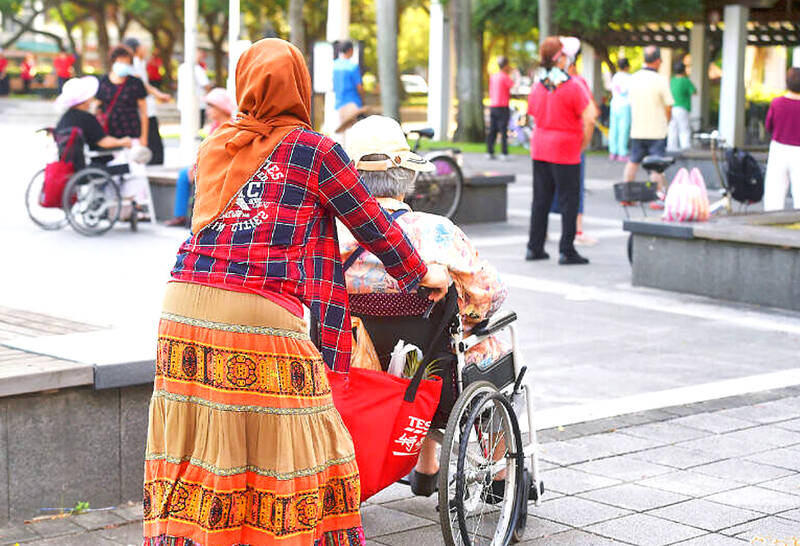A program allowing eligible families to hire migrant caregivers for a minimum of four hours at a time would go into effect by the end of next month, and six selected employers under the program would soon be unveiled, a labor official said on Thursday.
Under the program first announced in May last year, eligible families are those with a member who has a certificate for a physical or mental disability, severe illness or injury.
It also includes households where a family member has been assessed as needing long-term care at levels 2 to 8, or has undergone surgery within the preceding three months.

Photo: Taipei Times
Under current rules, foreign care workers are usually employed on a live-in basis, residing with families who hire them to provide full-time care to someone in that household.
A distinctive feature of the program is that non-governmental organizations, including private foundations and nonprofits, would be the employers of the dispatched caregivers, rather than long-term care institutions, the Ministry of Labor’s Workforce Development Agency (WDA) said.
What sets the pilot program apart from other options is that services can be short-term and provided on short notice to cater to families with urgent needs, WDA senior specialist Hu Hsin-yeh (胡欣野) said.
The selected employers were commissioned because they have documented experience managing Taiwanese caregivers under the long-term care service system and have been in business for at least five years, she said.
However, some of the selected organizations could bring in labor brokers as they might not have the necessary know-how to recruit foreign workers, she added.
That means migrant caregivers could still have monthly “service fees” ranging from NT$1,500 to NT$1,800 deducted from their salaries, he said.
Su Yu-kuo (蘇裕國), head of the WDA’s Cross-border Workforce Management Division, said labor brokers would take care of migrant caregivers’ day-to-day lives, such as managing their dormitories, while recruitment, employment and management of caregivers would be the responsibility of the employers.
Su said that the six selected employers would only be able to commission labor brokers that have been rated “A” by the WDA for five consecutive years, or those that previously posted excellent results and for which evaluations have been waived.
People who hire migrant caregivers through the new program can expect to pay fees of between NT$1,000 and NT$1,250 for four hours, NT$1,200 to NT$2,500 for eight hours and NT$2,600 to NT$3,500 for 24 hours (which must include 10 hours of rest for the worker).
Exact prices would vary from one service provider to another, and a finalized chart outlining prices charged by each provider would be posted on the WDA’s Web site in due course, Su said.

NATIONAL SECURITY: The Chinese influencer shared multiple videos on social media in which she claimed Taiwan is a part of China and supported its annexation Freedom of speech does not allow comments by Chinese residents in Taiwan that compromise national security or social stability, the nation’s top officials said yesterday, after the National Immigration Agency (NIA) revoked the residency permit of a Chinese influencer who published videos advocating China annexing Taiwan by force. Taiwan welcomes all foreigners to settle here and make families so long as they “love the land and people of Taiwan,” Premier Cho Jung-tai (卓榮泰) told lawmakers during a plenary session at the Legislative Yuan in Taipei. The public power of the government must be asserted when necessary and the Ministry of

CROSSED A LINE: While entertainers working in China have made pro-China statements before, this time it seriously affected the nation’s security and interests, a source said The Mainland Affairs Council (MAC) late on Saturday night condemned the comments of Taiwanese entertainers who reposted Chinese statements denigrating Taiwan’s sovereignty. The nation’s cross-strait affairs authority issued the statement after several Taiwanese entertainers, including Patty Hou (侯佩岑), Ouyang Nana (歐陽娜娜) and Michelle Chen (陳妍希), on Friday and Saturday shared on their respective Sina Weibo (微博) accounts a post by state broadcaster China Central Television. The post showed an image of a map of Taiwan along with the five stars of the Chinese flag, and the message: “Taiwan is never a country. It never was and never will be.” The post followed remarks

Proposed amendments would forbid the use of all personal electronic devices during school hours in high schools and below, starting from the next school year in August, the Ministry of Education said on Monday. The Regulations on the Use of Mobile Devices at Educational Facilities up to High Schools (高級中等以下學校校園行動載具使用原則) state that mobile devices — defined as mobile phones, laptops, tablets, smartwatches or other wearables — should be turned off at school. The changes would stipulate that use of such devices during class is forbidden, and the devices should be handed to a teacher or the school for safekeeping. The amendments also say

CONSISTENT COMMITMENT: The American Institute in Taiwan director said that the US would expand investment and trade relationships to make both nations more prosperous The US would not abandon its commitment to Taiwan, and would make Taiwan safer, stronger and more prosperous, American Institute in Taiwan Director Raymond Greene said. “The US’ commitment to Taiwan has been consistent over many administrations and over many years, and we will not abandon our commitment to Taiwan, including our opposition to any attempt to use force or coercion to change Taiwan’s status,” he said in an exclusive interview with the Liberty Times (the sister newspaper of the Taipei Times) on Friday last week, which was published in the Chinese-language newspaper yesterday. The US would double down on its efforts